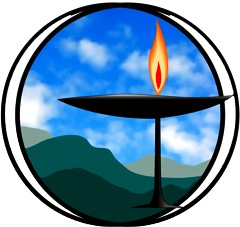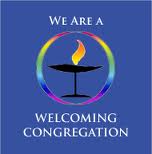Presenters
Index Page
Barker, Geraldine
Bodner, Mark
Burton, Laura
Castleberry, Kasey
Davis, Sam
Davis, Terry UU minister
Frost, Edward UU minister
Kibler, Myra
Nicholson & Brown
Sally Pamplin
Robison, Gerald
Seidman, Karl
Sheber, Larry
Sherod, Bob
Simmons, Antoine
Tremblay, Alexandra Immunologist
Waddell, Donna
Walker, James
West, Herb & Myrna
Woehr, Terry
Wood, Bruce
Other Sources
The Great American Religion
by Rev. Dr. Edward Frost
Presented 2011 October 23 to the congregation of Mountain Light Unitarian Universalist Church in Cherry Log GA.
One of the reasons for the emigration to the shores of North America in the 17th century was to establish new colonies in which religious groups, such as the Puritans, the German and Swiss Lutherans, and the Quakers could practice their religion freely. But to say that those oppressed people of faith were seeking to establish freedom of religion in America would not be strictly true. With the exception of the middle Atlantic colonies such as Rhode Island and Pennsylvania there was precious little religious freedom, and little, if any, religious toleration, in the new settlements.
The contracts and charters of the early colonies specifically forbade the practice of any but the "official religion" of the colony, and the punishment for heresy could be death or banishment. They punished anyone suspected of "popish practices" with public whippings or worse, and required everywhere, by law, attendance at the one available public worship. Fervent believers in their own faith, they were not believers in the right of anyone else to hold and practice a religion of free choice.
In spite of the almost fanatical intolerance of the colonists, however, there were factors which came eventually to make religious tolerance possible in America. First of all, sheer space can create a context for freedom. And there was plenty of space in North America. If the Massachusetts colony would not tolerate Roman Catholicism, the people could, and did, move to Mary-land. Where the Anglicans were made to feel unwelcome – as the next worse thing to Roman Catholics – they could, and did, move to the South. The Dutch Reformed and the German Lutherans settled to the North – and in New Jersey, and later, of course, to Lake Wobegon.
In time, this outward flow of settlers began to force an economic reality on the Pilgrim Fathers and their descendants. The financial backers of the colonies, the trading companies and the governments, realized that religious intolerance was, if not essentially irreligious, then economically impractical. The financial backers of colonization wanted to open up the prime trading areas in the new land, not limit them. So the ruling classes, the clergy and the colonial governors were soon forced by government and company decree to reluctantly admit believers of diverse faiths into their midst if not into their hearts. Religious toleration came to America, then, not so much as a Grand Ideal – the light from blighted and darkened Europe being brought to shine in the Promised Land – but as a very practical matter.
By the time of the revolution, religious pluralism in America was a fact – a fact of toleration if not acceptance. It only remained for the framers of the Constitution to make sure that no single religion could ever so bond itself with government as to wield power over other religions or over the state itself. In matters of religion, the framers of the Constitution themselves were, for the most part, religiously neutral or privately disinterested. And they were determined that the government itself was to be, if not a-religious, then religiously neutral. Benjamin Franklin financially supported just about every church that asked him. He did attend a Presbyterian church for awhile, but stopped going when he felt that the minister was more interested in making people Presbyterians than he was in making them religious.
The Jeffersonians believed that the primary function of religion was to support government in promoting the public welfare. It was therefore a function of government to protect the welfare of religion – just about any religion. Though Jefferson's personal religious ideas were profoundly liberal for his day – tending toward the unitarian – he believed that religious ideas – just about any religious ideas – promoted order, morality and contentment. For this reason, Jefferson said of the churches, they are all "good enough." And so it became the function of government to promote, not religion, but the free practice of religion and to prevent the coming to inordinate influence of any single religion. It was written, "Congress shall make no law in respect to the establishment of religion." Religious pluralism came to American, then, by steady progression. Quakers, Methodists, Anglicans, Lutherans, Unitarians, Roman Catholics, Baptists – all practicing freely with the protection and consent of the nation's constitution. The people did not need to tolerate each other socially, but they did have to tolerate each other legally. The Roman Catholics were free to practice their religion and in aristocratic Boston the Brahmin Episcopalians and their fellow aristocratic Unitarians were free to look down their noses at them.
Out of all the particular beliefs, and out of all the particular faiths, there arose in America a kind of "common faith:" a common religion by unspoken consent. This "common religion" has been variously called "Civic Religion," "The Religion of the Republic," and "The American Religion." The common religion boasts a belief in God, immortality, and Responsibility (some surveys guess that 90% of American "Believe in God." The Jeffersonians believed this was the essential faith of the churches which Jefferson deemed "good enough." Aside from those basic religious concepts, as far as the state was concerned, whatever else people chose to believe was their own business and irrelevant in the public realm. The American Republic, though it favors no particular religion, is not a-religious or non-religious and never has been.
"We believe that all men are created equal, and endowed by their Creator with certain inalienable rights." Abraham Lincoln, though he refused to belong to any specific church, was a firm believer in and adherent of the American Religion. "We must continue in the right," he said, "As God gives us to see the right." In every presidential inaugural – with the exception of Washington's – and in almost every political oration of note, the precepts of the American religion are set forth.
In 1948, Dwight Eisenhower said, "I am the most intensely religious man I know. Nobody goes through six years of war without a faith. That doesn't mean I adhere to any particular sect." And again in 1952, Eisenhower said, "Our government makes no sense unless it is founded in a deeply-felt religious faith – and I don't care what it is." In his Inaugural Address, John Kennedy said, "…I have sworn before you and Almighty God." And, Kennedy said, that Americans had fought around the globe for one tenet of the American religion, "The belief that the rights of man come not from the generosity of the state but from the hands of God."
A basic tenet of the American Religion is obviously that it doesn't matter what one believes as long as what one believes does not stray far from the core of the common religion. It is assumed in the religion of the Republic that everyone believes there is a God and that God favors and supports the American people, their endeavors, and "The American Way." American Religion and the American Enterprise are inextricably bound. The concept of the American Enterprise as being the "Second Exodus" was explicit in many speeches and essays of 18th and 19th century public leaders. Like the Hebrews of ancient time, The American people had a great Exodus, a journey melding a single, powerful identity E Pluribus Unum. The American Exodus was the Exodus from Europe. And the American people believe, like the Hebrews of old, that out of that Exodus, they became a chosen people.
An understanding of this element of the American Religion helps a little in understanding some of our foreign and domestic policy and of our general attitude toward the rest of the world. It is inconceivable to the average American that God could be anything other than the amalgamation of superman and Santa Claus conjured in the western mind's eye. The doctrine of "Manifest Destiny," as applied to and against other nations – including the nations of the indigenous peoples of America – has been grounded in the religious concept that God is like us, made in our image and sanctifies our ways. The American Religion has its rituals, priests, icons, places of worship, holy shrines, ceremonies, holy days – and even hymns. Almost every president has had what Philip Roth, in his novel "Our Gang," called "the spiritual coach" Billy Graham was the spiritual coach to a congregation of presidents. Think what it means that it was Billy Graham's religion which has provided spiritual guidance to decades of American political leadership. Well, what it means is precisely nothing. Religion, in the realm of politics, is "good enough" as long as it is essentially meaningless and without significant effect or requirement.
It has been a long, long time since the nation has heard prophetic preaching like that of Harry Emerson Fosdick, founding minister of Riverside Church in New York, who, during the First World War, called the churches, "Adjuncts of the war department." Or preaching like that of Unitarian Community Church's John Haynes Holmes, who continued to preach pacifism in the face of war fever. The spiritual coach – the priests of the American Religion – are morally and ethically neutral in matters of state. They have to be. That's the American Way in Religion. The political leaders decide where God stands and civic religion's preachers cry "Amen."
The Founding Fathers considered the value of religion to be that it helped keep the Commonwealth together. Sociologists of religion, like Max Weber, have called religion, "the glue that binds society." The American Religion has High Holy Days such as Memorial Day and the Fourth of July. On these days the processions form with symbols and icons held high – processions proceeding to the meeting places where clergy of the Republic's faith call down the blessings of its God on all we have done and on all we are about to do.
In a congregation I once served, I earned the animosity of many of its members by refusing to take my turn at offering public prayer at the city's observance of national holy days, and for refusing to personally ring our church's steeple bell when the war in Vietnam was officially over. I am not unpatriotic; but I am also not, as Fosdick said, an adjunct of the war department. I am not a functionary to legitimize public celebration of barbaric behavior – whatever the outcome – and I am not a believer that being patriotic means holding and preach the doctrine of "my country, right or wrong, my country" Those clergy who have stood against the behavior of the Republic are often branded as malcontents at best and heretics and worst. It is unthinkable to devotees of the American Religion that any clergy person would suggest that what America does and how American lives might either be contrary to the Will of God or of no interest to God at all. The religious right – including the "Tea Party" sect – rises from the ground of rigorous dogma, passionately held, intransigent, committed and intolerant. Several GOP candidates for the presidency have signed a pledge that, if elected, they will work toward an amendment to the Constitution that will declare that marriage is to be defined as between a man and a woman. One front-runner candidate has declared that evolution is "just a theory."
The religious right holds its own dangers for America. The American Civic Religion is vacuous, empty, without ethical or moral content or moral demand. And that, too, holds its dangers. To say that God exists is to say nothing that changes the world for the better. A biblical writer said that the devil himself believes that God exists. Every nation that has tried to rape the world and oppress and enslave its people has carried with it into battle the belief – or at least the declaration – that God was on its side. Every army has chaplains in its ranks.
Because the American Religion is without form and without significant content and because it is without ethical or moral demand, it is largely impotent – powerless to do what religion ought to do – and that is to stand in prophetic judgment of the state. Even the personal priest of the Roman emperors had a more prophetic role than our spiritual coaches. The Roman priest's function was to stand behind the emperor as the crowd's roared their acclaim and whisper into his ear from time to time, "Remember, thou art mortal."
If the churches and sects of the Republic have lost their bearing and significance, it is because they have surrendered their identities to merge and become indistinguishable from the great, vague, meaningless civic religion. I see that the minister of a church in my neighborhood is beginning a series of three sermons on the Apostles Creed: as if it could possibly matter – as if such an exposition could possibly matter to our world of sorrow, tragedy and atrocity.
With the exception of a Berrigan brother here and there, the prophets of the nation are not the faith communities or the clergy judging from altar and pulpit. Today's prophets are much more likely to be writing in the editorial pages of the daily newspapers. So, in spite of what the Constitution says, there is an established religion in America. It is the recognized religion of the Republic, the American Civil Religion, inseparable from the American politic, and inseparable from "the American Way of Life" Its God is praised on its currency, sworn to in its classrooms and courtrooms, and invoked amid the chatter in its legislative halls. There is no doubt in my mind that if the western nations war with the nations of Islam it will be fought as a holy war. Christian "truth" pitted against Islamic error. The Blessed Trinity against Eastern Apostasy. The One True God, of course, on our side The next war will be a crusade.
Barry Goldwater (remember him?) said, "The price of freedom is eternal vigilance." But freedom is empty without justice. A great hymn says, "All whose boast it is that ye, come from forebears brave and free; If there breathes on earth a slave, are ye truly free and brave?" Eternal vigilance must be the price – not only of freedom – but of justice and possibility for every person. The Unitarian Universalist theologian, James Luther Adams, declared that "Faith must be the sister to justice."
Now, as much as ever, now more than ever, it is necessary for every person of faith in justice and compassion to take her and his religion seriously, to know its careful evolution in which its principles were crafted, to know the principles of a faith which commands commitment to ultimate values. When we pay attention to the beliefs of the presidential hopeful, it is critical that we pay attention to our own – that we know what difference is made by what we believe.
It is the function of true religion to be, not unpatriotic, but everlastingly suspicious of the state. When religion and the state find themselves in accord, religion must sleep uneasy with its bedfellow. For these are not true lovers. Where the state is obsessed with power, religion is obsessed with justice; where the state is concerned with wealth, religion is concerned with the lives of distinct human beings; where the state is concerned with national and civic pride, religion is concerned with compassion and mercy.
We religious liberals must continually pursue the nurture of a mature moral faith, faith which – far from being the handmaiden of the state – will be forever the itch and the conscience of the state. With all due respect to Dwight Eisenhower, America's civic religion is not "good enough." No religion is good enough which does not harass, buzz, and bedevil the state until the foremost mission of the Republic becomes justice, compassion and possibility for all.
May we hasten that day.






